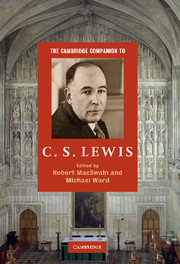3 - Literary theorist
from Part I - Scholar
Published online by Cambridge University Press: 28 November 2010
Summary
The claim that C.S. Lewis was a literary theorist is, from one point of view, uncontroversial. If literary theory is understood as the practice of reflecting philosophically on the nature and function of literature, then there seems little doubt that Lewis made a contribution to literary theory. In this sense, Aristotle's Poetics, Horace's Ars Poetica, Sidney's Apology for Poetry, Coleridge's Biographia Literaria and the Selected Essays of T.S. Eliot are all works of literary theory. Several of Lewis's books may be said to contain, or consist of, literary theory so understood: An Experiment in Criticism most obviously and explicitly, but also The Discarded Image, his side of the debate with E.M.W. Tillyard in The Personal Heresy, the chapters on the concept of the Renaissance in his English Literature in the Sixteenth Century, and the discussion of primary and secondary epic in A Preface to Paradise Lost. In this reckoning of Lewis as a literary theorist, we should include, moreover, a large body of essays, such as 'De Audiendis Poetis', 'De Descriptione Temporum', 'On Three Ways of Writing for Children', 'On Period Tastes in Literature', 'The Genesis of a Medieval Book', 'The Parthenon and the Optative' and 'Bluspels and Flalansferes: A Semantic Nightmare'.
- Type
- Chapter
- Information
- The Cambridge Companion to C. S. Lewis , pp. 29 - 42Publisher: Cambridge University PressPrint publication year: 2010
- 1
- Cited by



